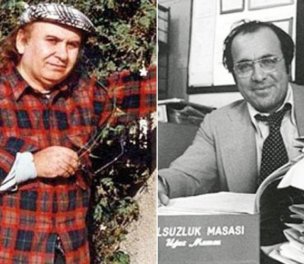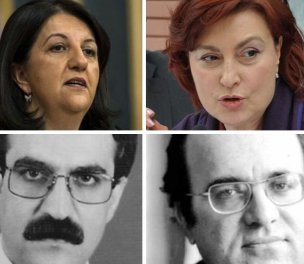Click to read the article in Turkish (1) (2)
Journalist-writer Uğur Mumcu was commemorated on Karlı Street in Çankaya, Ankara where he was killed at the age of 51 in front of his house 30 years ago in an explosion caused by a bomb placed under his car.
Many citizens came to the street starting in the morning and met in front of the Monument for the Victims of Unidentified Murders.
Besides the Mumcu family, the Republican People's Party (CHP) leader Kemal Kılıçdaroğlu, Ankara Mayor Mansur Yavaş, Yenimahalle Mayor Fethi Yaşar, and CHP MPs participated in the commemoration.
He was a journalist reporting on allegations of corruption, illegal organizations and their connections. He was silenced.
When he was killed Mehmet Ağar, the then-Interior Minister told Mumcu's wife Güldal Mumcu, "The wall will collapse if I remove one brick."
30 years have passed since Mumcu was killed. Some bricks were pulled but the thick walls did not collapse. Question marks related to the murder remain in place despite 30 years having passed.
His life
Uğur Mumcu was born in August 1942 as the third child of a family with four children in Kırşehir.
He started studying at the Faculty of Law at Ankara University in 1957. He received the Yunus Nadi award with his article called "Turkish Socialism" that he wrote while he was a student.
He worked in Yön, Kim, Akşam, Türk Solu, Ant, Cumhuriyet, Devrim, Ortam, Milliyet newspapers and magazines, and Anka Agency. He wrote 25 books and carried out tens of research studies.
Following the coup on March 12, he was detained on May 17, 1971. He was released one month later.
He reported what the leaders of the youth movement lived before and after the March 12, 1971 coup, making interviews with them.
He criticized the politicians who could not find a solution to terrorist actions in the article he wrote after ex-Prime Minister Nihat Erim was killed on July 19, 1980.
He wrote about religious sects, mafia-state relations, and corruption. He studied the issues related to Hizbullah, PKK, and counterguerilla issues. He focused on the Kurdish problem. Before he was killed he was working on the Kurdish problem, with a point of view distinguishing PKK and the Kurdish problem.
He married Güldal Homan in 1976 and they had two children, Özge and Özgür Mumcu.
The murder
Uğur Mumcu was a well-known journalist. He was receiving threats because of his journalism. He had spoken out about these threats before he was killed. However, he was not provided any guard by the officials to protect him.
He was assassinated on January 24, 1993, Sunday with a C-4-type plastic bomb placed under his car.
Süleyman Demirel, the Prime Minister, Erdal İnönü, the Deputy Prime Minister and İsmet Sezgin, the Interior Minister of the time visited the Mumcu family and promised to solve the murder saying "solving this murder is "a debt of honor for the state."
Investigation
Ankara State Security Court (DGM) Prosecutor's Office investigated the case from the very beginning. The file was given to military prosecutor Ülkü Coşkun however the investigation was not completed until July 11, 2000, despite seven years have passed.
Prosecutor Coşkun did not even ask for the list of people who called Mumcu's house from the post and telephone institution. Güldal Mumcu did everything she could in order for the investigation to advance. She visited the Ministry of Justice. Prosecutor Coşkun was also investigated, and inspectors concluded that Coşkun had delayed the completion of the investigation and ruled for a disciplinary penalty.
However since Coşkun was a military prosecutor, approval of the Ministry of Defense was necessary in order for the penalty to be imposed which was never given.
Gürdal Mumcu brought a lawsuit at the Military Administrative Court which ruled that the penalties will not be imposed. The justification was not declared on the grounds that it was a state secret.
Coşkun had said, "It is the state that has done this, it can be solved if the political power wants," which he rejected later.
Second stage in investigation
The Uğur Mumcu Murder Investigation Commission was established in the parliament on January 14, 1997. The commission completed its work in June 1997 which revealed that Mumcu was not protected despite the threats he received and that the prosecutors had not done their job.
The commission requested that investigations should be made for DGM Chief Prosecutor Nusret Demiral and former DGM prosecutor Ülkü Coşkun and also Erdoğan Şahinoğlu, the Governor of Ankara who did not provide protection to Mumcu and the other officials concerned. However such investigations were never made.
Later a letter from the DGM Chief Prosecutor Demiral was leaked instructing that no documents should be submitted to the parliamentary commission. However, no action was taken for this either.
Only the Interior Ministry instructed the crime scene investigation team in the aftermath of the murder to review the investigation again in line with the views of the commission. However, this did not bring about anything new.
"Hope case"
On January 17, 2000, the police raided the house of Hizbullah leader Velioğlu in Beykoz, İstanbul.
Velioğlu was killed, and two other managers of the organization were nabbed. An illegal organization called Tevhit - Selam / Al-Quds Army was revealed in the hard discs found in the raid. The organization was suspected to be carrying out attacks in connection with Iran. Operations continued and a new group, allegedly led by Ferhan Özmen was detained and remanded in custody. Arms, grenades, and explosives were also found in the operations.
The "Hope Case" followed these operations. 17 suspects started to stand trial in July 2000 in Ankara DGM no.2, 15 of whom were in custody. 18 events were included in the case file including the Uğur Mumcu, Muammer Aksoy, and Bahriye Üçok murders.
The indictment claimed that the bomb placed under Mumcu's car was made by Ferhan Özmen and placed under the car by Oğuz Demir with Necdet Yüksel serving as a watchman.
Necdet Yüksel, Rüştü Aytufan andFerhan Özmen were sentenced to aggravated life imprisonment for "trying to change constitutional regime by force." The files of Ali Akbulut, Selahattin Eş, Ahmet Cansız, Aydın Koral, and Oğuz Demir who were accused of providing the links of the organization with Iran were separated. In 2002, the Court of Cassation upheld the prison sentences given to Necdet Yüksel and Rüştü Aytufan and reversed the sentence for Ferhan Özmen.
In a second trial held in 2005, Ferhan Özmen was sentenced to aggravated life imprisonment and Ekrem Baytap to 15 years imprisonment. Abdulhamit Çelik, Hasan Kılıç, Mehmet Ali Tekin, Mehmet Şahin, Fatih Aydın, Muzaffer Dağdeviren and Yusuf Karakuş were sentenced to up to 6 years of imprisonment. The file of fugitive Oğuz Demir was separated and kept open.
The Court of Cassation upheld the last rulings in March 2014. In the decision of approval, the supreme court stated that Tevhit - Selam / Al-Quds Army had realized 18 attacks between the years 1988-1999 including murders of Muammer Aksoy, Bahriye Üçok, Uğur Mumcu, Ahmet Taner Kışlalı.
Today no one is left in prison, in this case, other than Ferhan Özmen and Necdet Yüksel who were sentenced to aggravated life imprisonment.
Oğuz Demir who placed the bomb under Mumcu's car is missing for 28 years and is being searched with a red notice by the Ministry of Interior.
In public opinion, the prevailing view is that Uğur Mumcu's murder has not been brought to light.
Mumcu family is therefore saying, "This file will not close until the real perpetrators behind this event are brought to light." (HA/PE)




.jpg)



